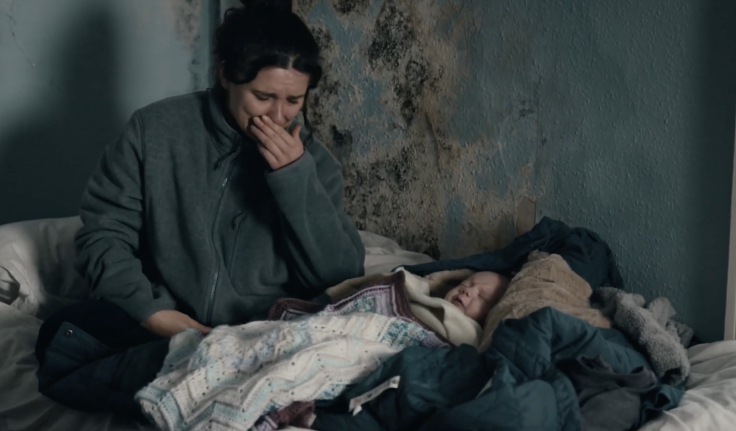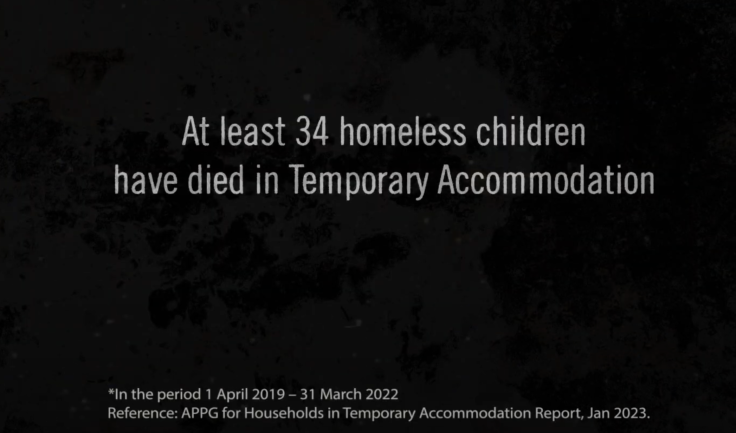
For weeks, Amnesty International has teased its series "Before Our Eyes."
But, announcing its shocking twist on social media, the human rights organisation wrote: "This isn't drama, it's real life."
According to Amnesty International UK, what viewers thought was a two-minute trailer for the drama was the short film itself.
Before Our Eyes set out to raise awareness of the shocking standards of accommodation given to homeless families in the UK; the plot follows a young mother, Anna, who watches her daughter die as a result of the accommodation that the council have placed them in.
Although the story is fictional, Amnesty International said that Before Our Eyes explores themes based on real-life events experienced by thousands of people without homes across the UK.
Between 2021 and 2022, the Child Poverty Action Group found that the cost-of-living crisis forced 350,000 more children into relative poverty in the UK. The statistics represented an increase in the number of minors living in poverty in the UK, totalling 4.3 million – equal to 29 per cent.
Official figures published by the National Library of Medicine exposed that 34,000 children aged five and under are admitted to hospitals with respiratory conditions caused or worsened by dampness and mould in the UK each year.
This month, the National Child Mortality Database (NCMD) also revealed that temporary housing contributed to the deaths of dozens of babies in the four years between April 2019 and March 2023.

Temporary accommodation usually provided by councils includes B&Bs, hotels, hostels, and houses.
Awaab Isha was just two years old when he died because of mould in a social housing flat in December 2020.
The Sudanese nationals' family lived in their one-bedroom social housing flat in Rochdale, England. Their home was poorly ventilated, spreading black mould throughout the kitchen, bathroom and bedroom.
The tragic death of the toddler highlighted the treatment of low-income and homeless families in the UK.
Faisal Abdullah, who lost his son just eight days after his second birthday, has since urged the government to implement strict deadlines for landlords to eliminate mould in both the private and social housing sectors.
"I can't emphasise enough, for those tenants who find themselves in similar situations, not to waste time," Abdullah said.
"Even if it means getting out of the accommodation, please do so because if you've got children and it takes longer to find a remedy, that will be at the expense of the health of the children or you as an adult."
The NCMD research, funded by the NHS, showed that temporary accommodation was a factor in the unexpected deaths of deaths of 55 children.
Responding to the results, Labour MP Siobhain McDonagh said: "It is shocking that in the fifth-largest economy in the world, children are dying because of the accommodation they are being housed in."
"Some of the conditions that I see are unfit for anyone to live in, let alone a child. It is the wild west out there," she added.
While making the Before Our Eyes drama, Amnesty International interviewed a young woman whose lived experience in squalid housing could guide the project.
"Charlotte Beecham", 37, whose name was changed to protect her real identity, has shared her tragic homelessness story in her blog.
Having lived in temporary accommodation since she was 18, the mother of two said: "I wanted to work with Amnesty in the making of this film to show how things are, and this film shows how it is for real, for thousands of people."
On her blog, Beecham explained: "When I turned 25, I was moved into a flat in a tower block, and even though it was temporary, we lived there for six years."
"The conditions were very bad. The flat had mould and dampness, which caused my children to develop asthma and eczema. Sometimes, you'd go down to the bin shoot area and see people dead in it – I saw seven people who had died there from drug use. There were stabbings and shootings; it was horrible, and I was scared for my children."
"I only had one meal a day, made up of leftovers from my children's meals. Otherwise, I wouldn't have had enough to feed them. Some days, I didn't even have that – I mainly drank water to stop from feeling hungry."
This news comes after the charity group Maternity Action exposed that 25 per cent of women on maternity leave in the UK had skipped meals to afford to feed their families.
The survey, published last month and conducted on behalf of the public service union Unison, studied 1,400 new mothers across the UK.
The local authorities later moved Charlotte into hotel accommodation, which she described as a "drafty room with two beds and a shower room that had mould."
"We had no facilities for washing our clothes. There was a shared kitchen on the ground floor, but people stole our food and used our pots and pans," the mother of two added.
Charlotte recalled a night when her daughter "woke screaming because a mouse was on her bed."
The squalid conditions sent her into a deep depression, as well as her adolescent son and daughter.
"They were just seven and ten years old," she said.
The small family was then moved to a house "riddled with mould."
"We lived upstairs because the conditions downstairs were so bad," Charlotte explained, going on to reveal: "My children and I have suffered chest infections as a result of the housing conditions and also have asthma that has got worse over the years."
Pointing the finger at the government for blaming homelessness on substance abuse and life choices, Charlotte said: "That's not the case - but that's the narrative they're still pushing. Nine times out of ten, someone is homeless because they are a vulnerable person being taken advantage of."
According to the European Federation of National Organisations Working with the Homeless, FEANTSA, one in three women in the EU, 33 per cent, have experienced physical or sexual violence since they were 15 years old.

The homeless federation also reported that domestic context is frequently cited as one of the most significant contributors to women's homelessness, making women more vulnerable and more likely to be exposed to different forms of violence when homeless.
"Homeless women face extreme physical, emotional and psychological challenges and are in active states of crisis," FEANTSA wrote.
The federation also found that homeless women are more likely to use drugs than men, often pushing the vulnerable females into sex work and prostitution. Being involved in different forms of sex work only heightens the threat of sexual and emotional violence to unhoused females.
Women are more vulnerable while they are homeless due to the lack of women's-only refuges, FEANTSA reported, noting that in London alone. In contrast, 1,175 women were found sleeping rough by outreach teams in 2023; there is only one refuge dedicated to women in the capital.
The women's complex holds just ten spaces for women in the entire city, the FEANTSA report added.
The short film features Olivia Colman, who has been an ambassador for Amnesty International since 2014.
Appearing as a former lawyer named Mary, Colman said she wanted to be involved in Before Our Eyes because "it's easy to feel like we do enough and that human rights are for someone else to sort out."
"One of the things that I am most surprised about is the level of human rights abuses that happen in our own country," Colman added.
Actor Adrian Lester, best known for his roles in Hustle, Undercover and Trigger Point, plays the role of a council worker.
"No matter what strata of society you find yourself, your human rights protect you... It's great to work with an organisation that is all about protecting those human rights," Lester said.







